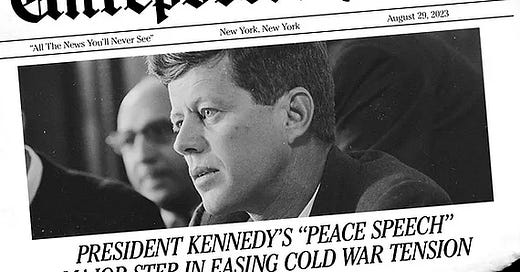Film Review, Four Died Trying (Prologue episode)
The Revolutionary, Truncated Lives of JFK, Malcolm X, MLK, and RFK
By Mike Jackman, Special to The Kennedy Beacon
“What kind of peace do I mean? What kind of peace do we seek?”
These immortal words were spoken by President John F. Kennedy on June 10, 1963, during commencement at American University, in what has since become known as the Peace Speech. The America of 1963 had been embroiled in the Cold War since the late 1940s and had approached the edge of nuclear oblivion the previous year during the Cuban Missile Crisis. The possibility of the obliteration of tens of millions of lives weighed heavily on the young president.
In his prologue episode, which begins streaming November 22 on Apple TV, director John Kirby sets the stage for the new documentary series Four Died Trying by highlighting these dangerous events, before focusing on each of the four revolutionary leaders whose brinkmanship and efforts for peace and justice would lead to their murders. [In full transparency, the Executive Producer of the documentary series, Mark Gorton, is also co-chair of American Values 2024, the super PAC supporting Robert F. Kennedy Jr. for president. The PAC funds The Kennedy Beacon.]
Following a clip from JFK’s Peace Speech speech, Kirby cuts to Malcolm X’s words about the nature of power, and Martin Luther King Jr. preaching about the American bombs being dropped in Vietnam, which reverberated back home in the United States. The opening salvo finishes with Senator Robert F. Kennedy talking about how the government ignores the needs of Americans who are suffering, while sending billions to fuel conflict in the name of freedom.
This is a foregrounded theme of the series: There is always money for war but not to combat poverty. Six decades later, with our nation facing more than $30 trillion in debt, a mental health crisis, and overall decline, these sentiments and themes are more relevant than ever. The US continues to fund wars and send weapons all over the world, including to Ukraine and Israel. For a time, in the aftermath of the Vietnam War, there was perhaps a hope that we had learned lessons from the 1960s. Even after 9/11, there were strong calls for peace, but violence and tensions continue to build globally, and few of those in power today are credibly trying to oppose war. As Mark Twain is said to have remarked, history doesn’t repeat itself, but it often rhymes.
Through a medley of dozens of fresh interviews conducted over seven years, eye-catching animation, and news footage, Four Died Trying brings viewers into the dark underbelly of American politics and shows how the levers of power were used to manipulate public opinion.
A family gathered around their television in November 1963, for example, watches as the accused assassin in Dallas, Lee Harvey Oswald, is gunned down by Jack Ruby during a live broadcast. The media assured the nation that these events were the work of deranged and unconnected loners, just as they would claim after the assassinations that soon followed, and as they continue to insist. Ever since these pivotal and shocking assassinations, Americans’ trust in the media and our institutions has steadily eroded. Yet there has also been, to this day, a chilling effect on anyone in power who questions our never-ending warfare or seeks to end it.
Viewers hear from over 120 witnesses and commentators, including the children of MLK, RFK, and Malcolm X and JFK’s associates and relatives. These figures bring particular insights that you won’t often see on cable news or in many “mainstream” accounts of the events. The views espoused by the four leaders’ families and associates are actually more sober, tempered, and thoughtful than the cartoonish and nonsensical takes that have been forced upon us all these years. They ask the real questions and make the real points. We hear, for example, from current independent presidential contender RFK Jr. and from St. John Hunt, the son of the late CIA man E. Howard Hunt, who confessed on his deathbed to involvement in the plot to assassinate President Kennedy, claiming to be a “benchwarmer for the big event.” It’s important and fascinating to hear these firsthand perspectives from speakers whose lives were directly touched by this history.
Four Died Trying should be shown in high school history and civics classes. This is the history lesson we must teach our descendants, if we are to ever have a more informed citizenry with the ability to analyze these and other major events critically. If we cannot face our own dark history as a nation, how can we heal from the wounds it has inflicted, and move on to shape a better tomorrow?
With convincing precision and effective pacing, the prologue to Four Died Trying lays out what happened to these young leaders but also asks “What are we going to do now?” By the end of the prologue episode, viewers have been given key pieces of the puzzle and a grounding in the evidence. This is the beginning of a series that feels final and definitive. We may be nearing the end of the road, like all empires. Will we face up to our past and correct course before it’s too late? That is the real question. If there’s one film series you stream to mark and discuss the 60th year since President Kennedy was murdered, it should be this one.








This is fantastic news. I will make it a required viewing for my film students. Thanks so much to everyone involved in making this happen. My tears of joy are abundant as I write this. God bless all of those who are trying to make our world safe for everyone. 🌄
Yes! Let's stop using memorization as an actual sign of intelligence. We are living in a world where lists, maps, spell check, etc. exist and are available. Let's teach unadulterated history (truth) to young people. If they can handle the violent gaming world, the violence on TV, in films, and sometimes on their own streets, they can handle the truth. Teach them civil discussion and debate. Teach them how to learn, and critical thinking. And let's be role models of peace, kindness and love.